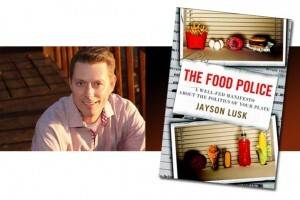
When it comes to countering criticism of conventional agriculture, a noted food economist and farm advocate said last week that the most powerful thing farmers can do is tell their stories.
“The research shows that guys like me, academics like me, can get up and give people all kinds of statistics and people roll their eyes, and that statistics do not convince people,” Jayson Lusk told a group of producers and ag advocates during a presentation July 8 at Iowa State University. “Often logic doesn’t convince people. What really convinces people are stories.”
Jayson Lusk, a food and agricultural economist and author, was in Iowa to speak to an invited crowd at Iowa State before traveling to speak to the Iowa Grocers Iowa Grocery Industry Association Convention in Okoboji on July 9. Latham was among the sponsors of Lusk’s Iowa State appearance.
Lusk’s book “The Food Police: A Well-Fed Manifesto About the Politics of Your Plate” debunks many criticisms of modern agriculture — from claims of environmental plunder and cruelty to animals to recklessly using GMO crops and creating a “toxic food environment” — and warns against the rise of what he calls the “food police” and “food elite” who seek to use government power to damage consumers’ freedom of food choice and farmers’ freedom to operate.
Lusk, who is a professor in the Department of Agricultural Economics at Oklahoma State University, advised farmers and their representative organizations to “get in the game” and use the stories of their operations as a way to communicate the many benefits modern agriculture brings to consumers, such as:
- Because of innovations in farming in the last 100 years, farmers produce dramatically more crops on less land than in 1900.
- The American food supply is the largest, most diverse, safest and cheapest in the world.
- The average American spends just 10% of his or her disposable income on food (including restaurant food), the lowest of any country in the world. “That means we other 90% of our income to spend on things that make our lives easier and more enjoyable.”
“Those of you involved in production agriculture are a lot more credible and a lot more compelling than I am,” he said. “The things you can say, even if you haven’t read all he things I have, you know more about production agriculture than I do and you can talk about why you do the things you do, and the research shows that matters (when persuading others).”
Tune in this coming Thursday for Part 2 of our recap on Jayson Lusk’s advice to farmers on how to counter criticism of conventional agriculture.
